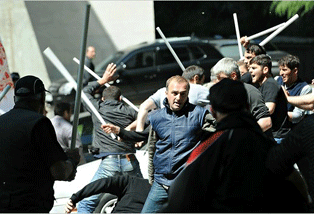Mzia Kupunia contributed reporting from Tbilisi, Georgia.
MOSCOW — The police clashed with antigovernment protesters in Georgia on Sunday, at one point firing tear gas and rubber bullets, as hundreds of demonstrators gathered in the capital of the former Soviet republic to demand the ouster of President Mikheil Saakashvili.
The protesters, some concealing their faces with masks and carrying clubs, gathered at the headquarters of Georgia’s public television channel in the capital, Tbilisi. About 2,000 people attended the rally, officials said, small by Georgian standards.
They accused Mr. Saakashvili of stifling pro-Western democratic reforms promised when he came to power in a bloodless coup in 2003. They also expressed anger at continuing poverty and unemployment.
Though the demonstration was largely peaceful, about a dozen protesters attacked a police cruiser with sticks early Sunday morning, prompting the police to retaliate, said Shota Utiashvili, a spokesman for the Interior Ministry.
“Police had to use a small amount of tear gas and rubber bullets against a small number of demonstrators,” Mr. Utiashvili said. He said two people were arrested, and five people, including the three police officers in the car, suffered minor injuries.
In another episode, demonstrators armed with sticks battled in the streets against unidentified men thought to be plainclothes police officers, according to local news reports.
Sunday’s violence, though relatively minor, revived memories of a brutal police crackdown on protesters in 2007. About 500 people were wounded then, when police officers used rubber bullets, water cannons and tear gas to disperse thousands of antigovernment protesters.
The violence prompted strong international condemnation and undermined Mr. Saakashvili’s popularity at home, and the government has since sought to avoid such clashes.
Large protests are not uncommon in Georgia. Sunday’s demonstration was a continuation of antigovernment rallies a day earlier that drew several thousand people throughout the country. Opposition leaders have vowed to keep up the protests until Mr. Saakashvili resigns, though similar efforts in the past have fizzled.
By law, Mr. Saakashvili must step down as president when his term ends in 2013. Despite several major crises during his tenure, including a short war with Russia in 2008 and the effective loss of two rebel territories, he remains fairly popular in Georgia.
Georgia’s opposition, meanwhile, is racked by internal conflict and has been unable so far to put up a serious challenge to the ruling authorities. Several opposition parties boycotted the demonstrations on Saturday and Sunday.
At Sunday’s protest, organizers said Mr. Saakashvili and his government had undermined the opposition by denying it access to the news media and by rigging elections, charges the government has always denied.
Nino Burdzhanadze, a former Saakashvili ally who has become a prominent opposition leader, said the police had detained as many as 100 opposition activists over the weekend in an effort to thwart the protests.
“Unfortunately, my native country is less democratic than in 2003 before the democratic revolution,” Ms. Burdzhanadze said by telephone.
A few hundred people continued to protest as of Sunday evening, and many vowed to stay overnight. Some have called for a “Day of Rage” to be held on Wednesday, using the name given to several large protests that have challenged authoritarian governments in the Middle East this year.
“Saakashvili must go unconditionally,” Laura Machaidze, a 57-year-old unemployed economist, said at Sunday’s protest. “Then fair elections should be held and the people should decide who they want as a leader.”
foreignpress.ge
Original text




